The most common academic databases that students usually hear about are JSTOR, PubMed, and Google Scholar. These names stay relevant because they provide peer-reviewed content, and professors trust their materials. These databases include scholarly literature that can be confidently referenced in academic writing.
This article presents a list of academic research databases, both free and paid. By the end of it, you will know what each platform does best. And if you have already found the right sources but struggle to structure your work, free essay writer can help you outline and draft it.
Original Papers Start Here
Human writing that keeps your work safe and original.
Order Now
Criteria for Choosing Academic Databases for Research
A research assignment asks you to investigate a topic with solid proof. That answers the question of what is academic research. Finding the right sources often becomes the hardest part of the process. But once you understand what makes a reliable database, the selection becomes a lot easier. Let's see what should guide your choice.
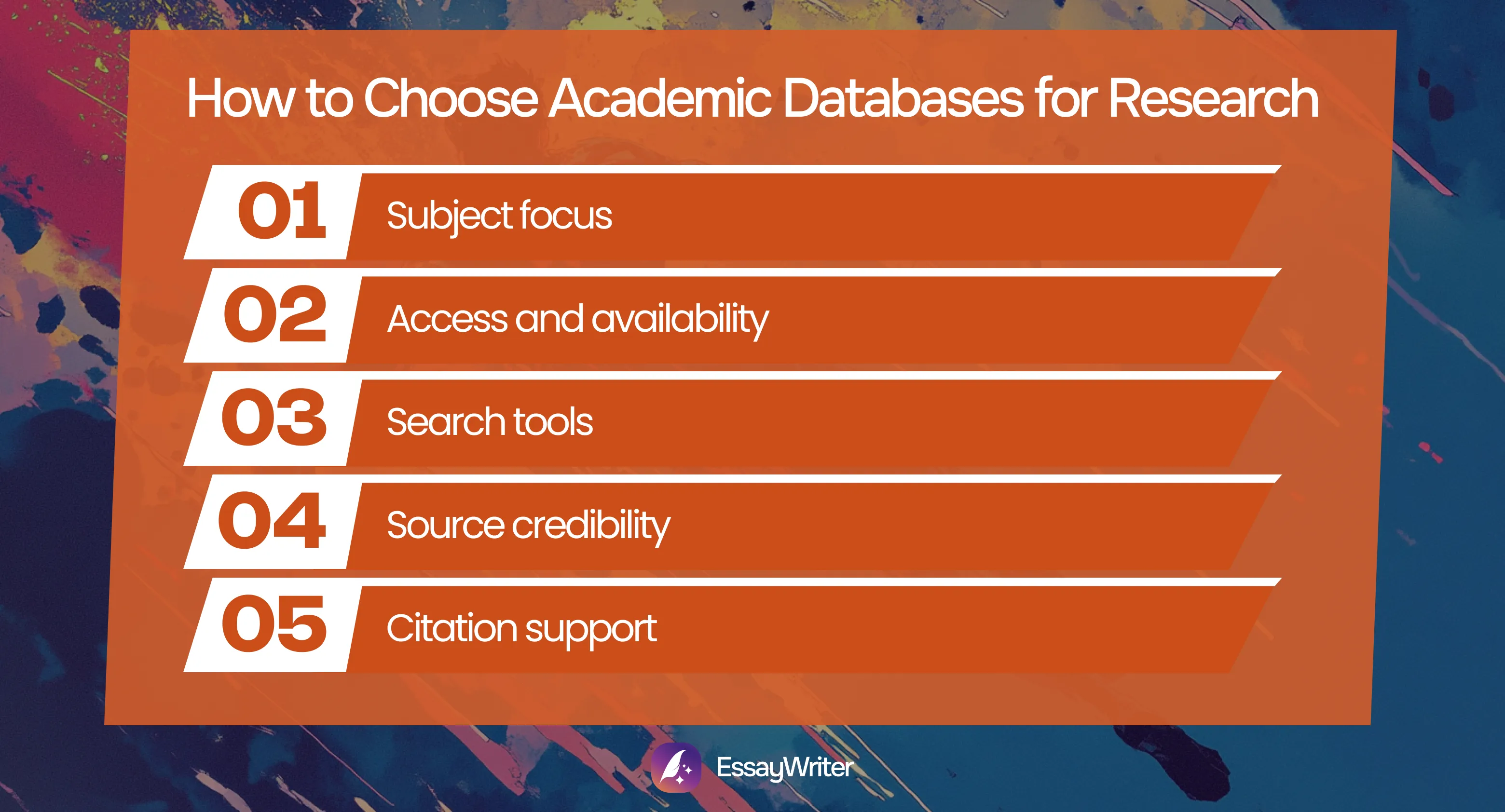
Subject Focus
Each database organizes knowledge around particular academic areas. Some collections center on science and data-based inquiry, while others focus on, for example, social questions or culture. A database reflects the current conversations within the particular field, and that means that the material you find will match the themes used by scholars who study that topic. A clear match between your topic and the database focus leads to stronger sources and, consequently, stronger research.
Access and Availability
Access determines how easily you can use a database. There are some open-access journals that don't require logging in, while there are some that require university or library credentials. A free database still offers meaningful academic articles, as long as the content remains peer-reviewed or professionally curated. If your school offers authentication or remote access, the range of sources you can reach becomes significantly wider, giving your research more depth.
Search Tools
Detailed filters make it easier for you to find the right source. You can refine your search by publication date, document type, subject category, and even the depth of analysis. A clear search engine helps you reduce the time spent sorting through unrelated materials. Functions such as advanced search fields or keyword mapping encourage more precise searching.
Source Credibility
Credibility forms the foundation of academic work. The best databases collect research that has gone through careful editorial or peer review. This means experts in the field have examined the methods, arguments, and conclusions before publication. Reliable sources add credibility to your writing and allow your argument to hold strong under evaluation.
Citation Support
Citation support becomes important once writing begins. Academic work requires accurate crediting of ideas, and citation formatting can be time-consuming. A database that provides citation information in recognized academic styles allows you to record your references cleanly without retyping everything by hand. This feature helps maintain consistency in your bibliography and reduces stress during the final editing stage, especially when deadlines feel close.
Best Academic Research Databases for College Students
There are many free academic research databases out there, but most students usually begin with Google Scholar or PubMed. These platforms are the most popular because they easily help you understand how to approach the research process.
Take a look at 10 of the best-known databases below.
Google Scholar
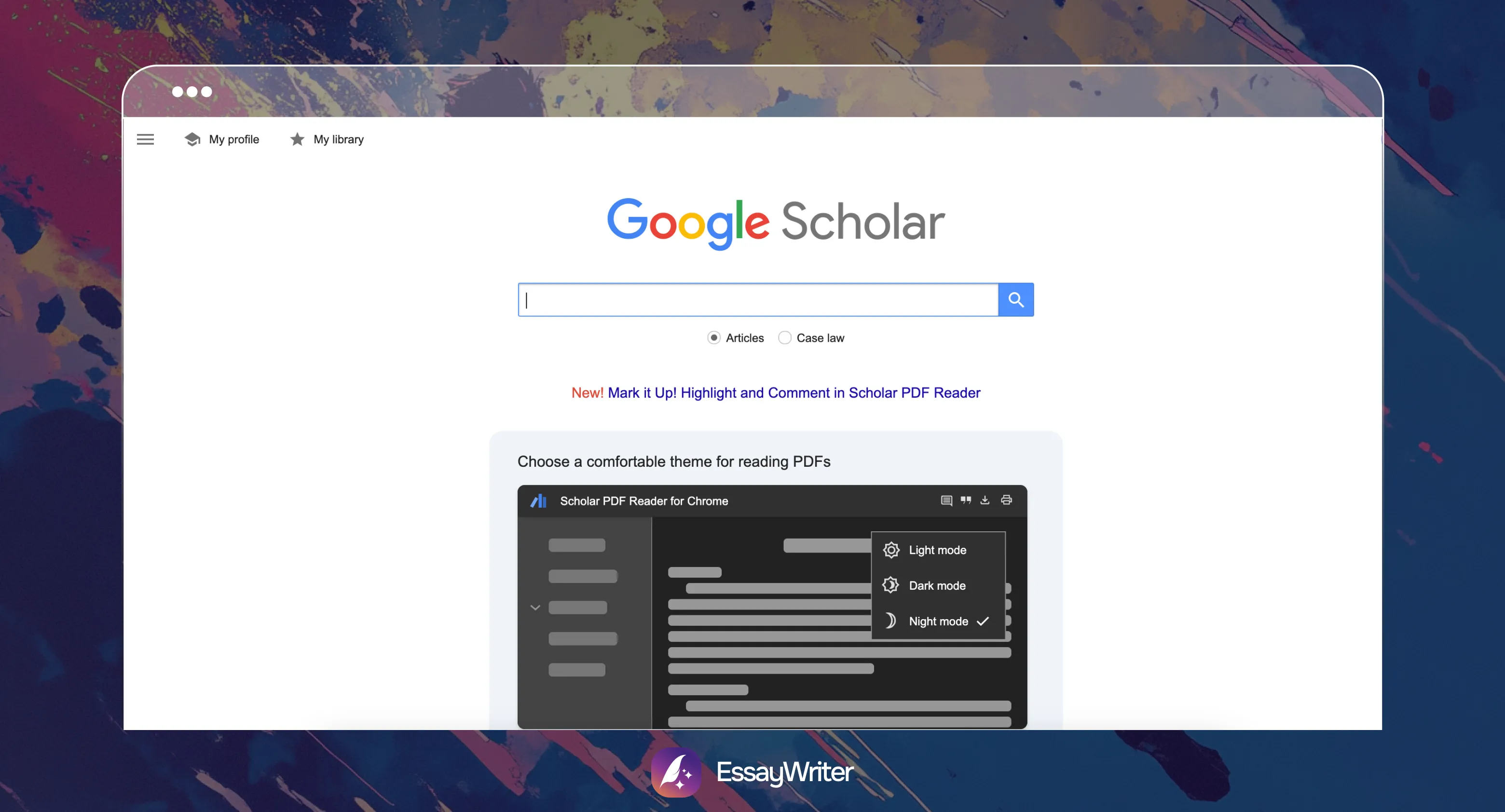
This platform helps you scan a wide range of scholarly literature to notice patterns in how researchers reference one another. It becomes useful the moment you need to ground an idea in credible evidence.
- Scope: Broad search across journal articles, books, theses, and institutional repositories.
- References: Citation counts show how often authors engage with the work.
- Subject Areas: Supports humanities, sciences, social research, and professional fields.
- Access: Open to all users, with links to full texts when available.
- Provider: Operated by Google as part of its academic search and citation indexing service.
JSTOR
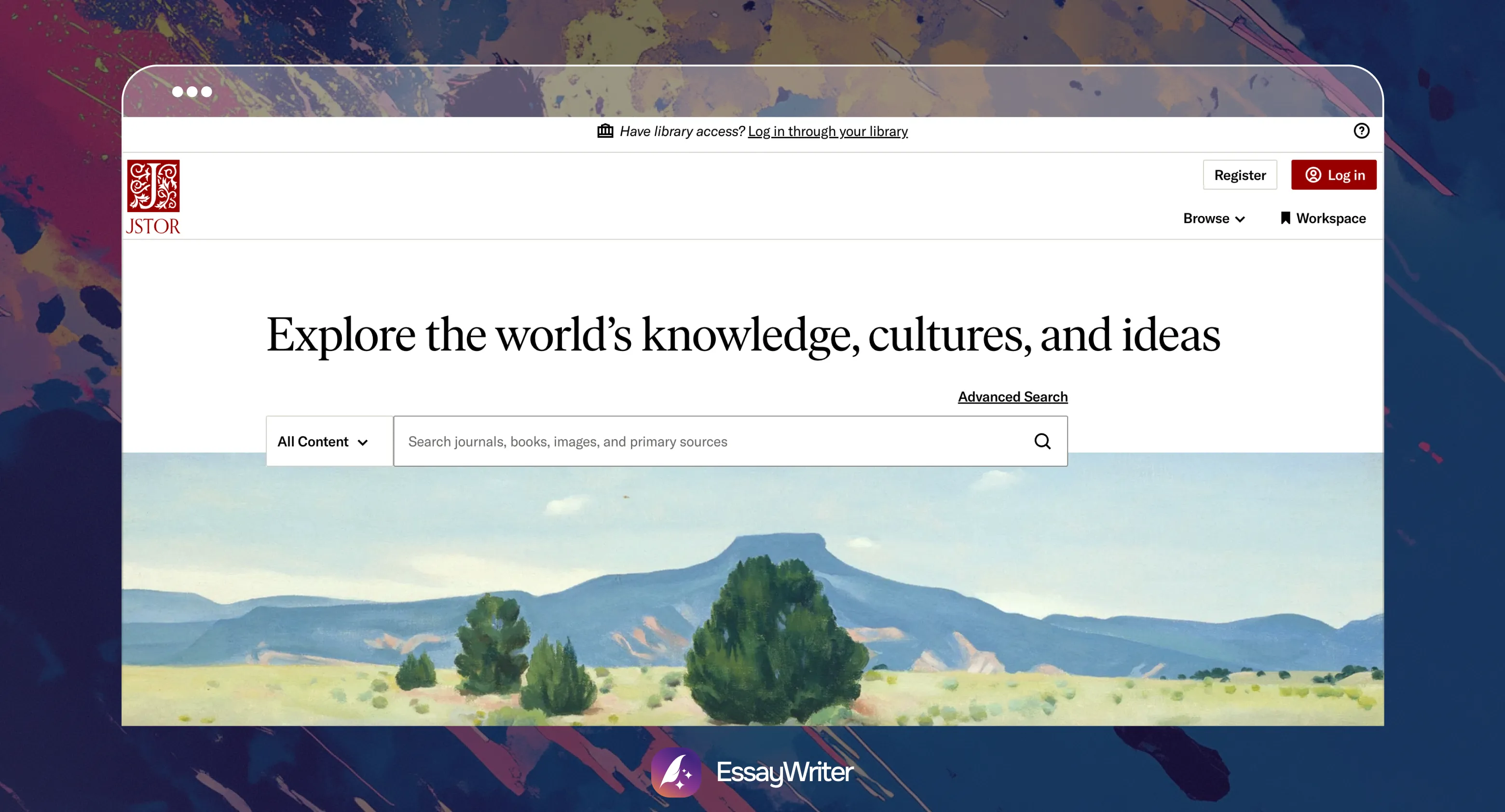
This database supports slower, thoughtful research. It lets you read how ideas develop across many years and notice the conversations that connect different scholars.
- Scope: Collections of journal articles, books, and historical documents.
- References: Consistent pagination assists quotation accuracy.
- Subject Areas: Strong grounding in humanities and social inquiry.
- Access: Often provided through campus library credentials.
- Provider: Operated by ITHAKA, a nonprofit organization focused on academic preservation and access.
Scopus

Scopus works well when you want to see how academic thinking evolves over time. It highlights how studies influence one another and how certain authors guide discussions in their fields.
- Scope: Journal articles and records, conference summaries, and scholarly series.
- References: Structured citation pathways show how ideas move across publications.
- Subject Areas: Suitable for scientific inquiry, medical fields, business research, and applied study.
- Access: Commonly included in university library subscriptions.
- Provider: Maintained by Elsevier, a global academic publishing company.
PubMed

This platform is for those who especially prioritize precise research. Here, you will find carefully indexed scientific work that helps you read clinical and biological information without confusion.
- Scope: Journal articles, clinical studies, and scientific reviews.
- References: Detailed abstracts guide reading decisions early in the process.
- Subject Areas: Medicine, nursing, public health, biology, and related fields.
- Access: Freely searchable, with full texts available when permitted.
- Provider: Operated by the U.S. National Library of Medicine (NLM) at the National Institutes of Health.
DOAJ (Directory of Open Access Journals)

DOAJ encourages open scholarship by giving direct entry to academic articles without price barriers. It supports transparent publishing and helps you collect sources quickly.
- Scope: Peer-reviewed research articles released without paywalls.
- References: Clear metadata supports source documentation.
- Subject Areas: Broad coverage across academic disciplines.
- Access: Fully open and usable without login.
- Provider: Managed by Infrastructure Services for Open Access (IS4OA) and community-supported globally.
ScienceDirect
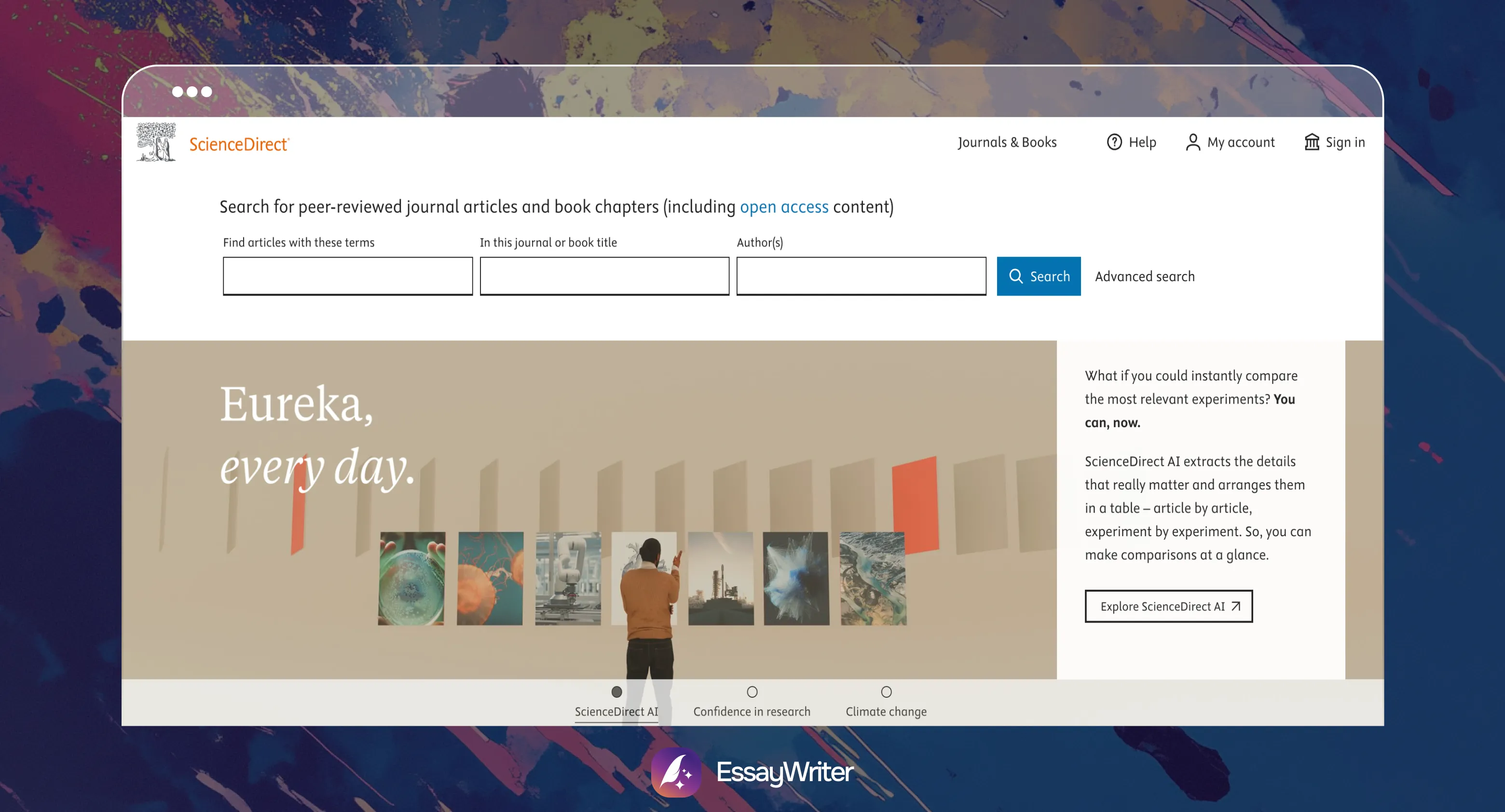
ScienceDirect offers research that often includes detailed methods and data presentation. It works well when your assignment depends on careful interpretation and evidence-based reasoning.
- Scope: Journal articles and academic eBooks with detailed research data.
- References: Integrated reference sections assist follow-up reading.
- Subject Areas: Life sciences, physical sciences, engineering, and applied research.
- Access: Typically available through institutional subscriptions.
- Provider: Managed by Elsevier, one of the world’s largest academic publishers.
IEEE Xplore
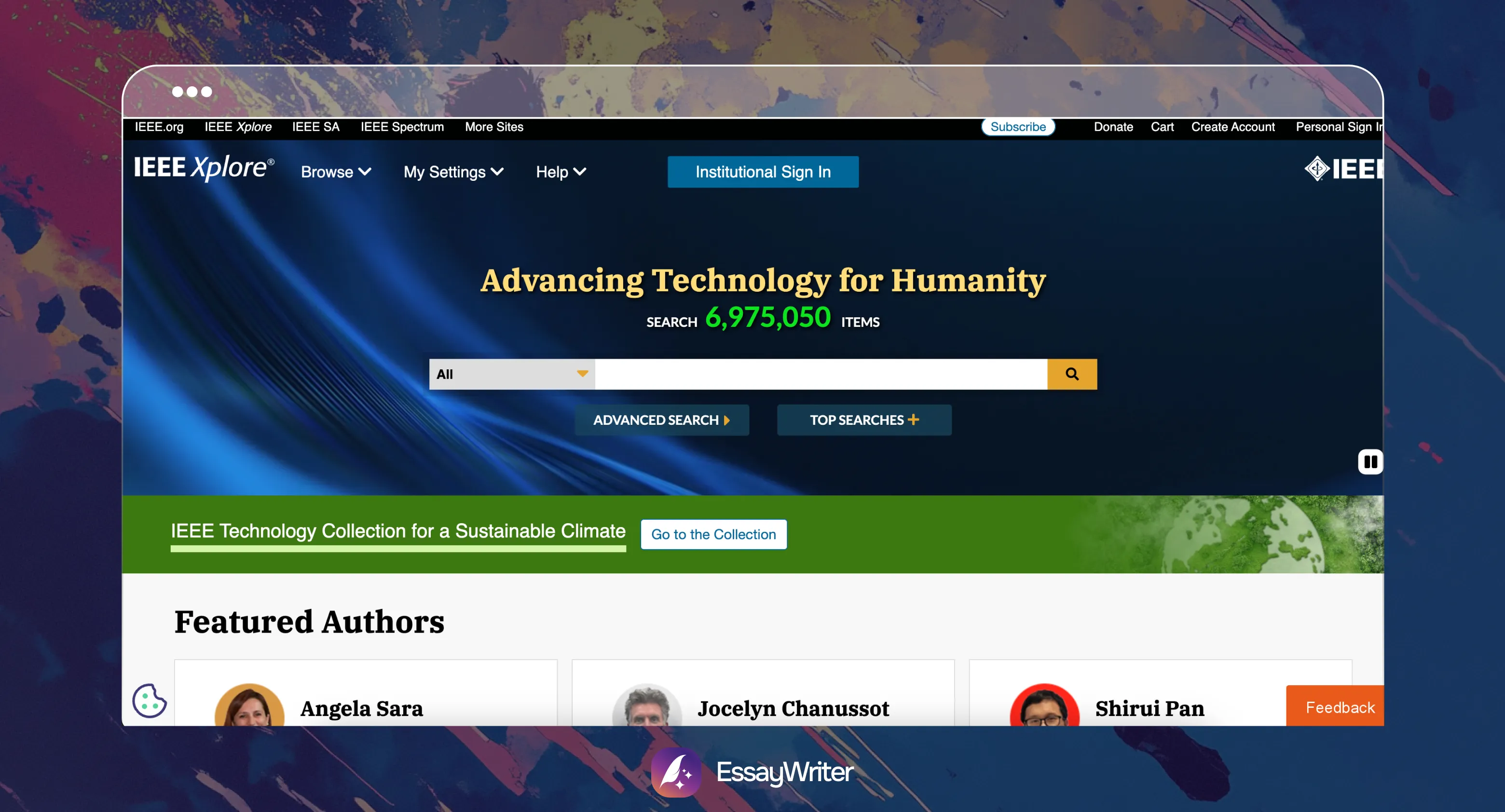
This database supports coursework and research connected to technology development. It provides access to the latest ideas in engineering and computing practice.
- Scope: Journals, technical standards, and conference proceedings.
- References: Structured source information helps frame technical arguments.
- Subject Areas: Electrical engineering, computer science, data systems, robotics.
- Access: Usually integrated in university research library systems.
- Provider: Run by the Institute of Electrical and Electronics Engineers (IEEE).
Web of Science
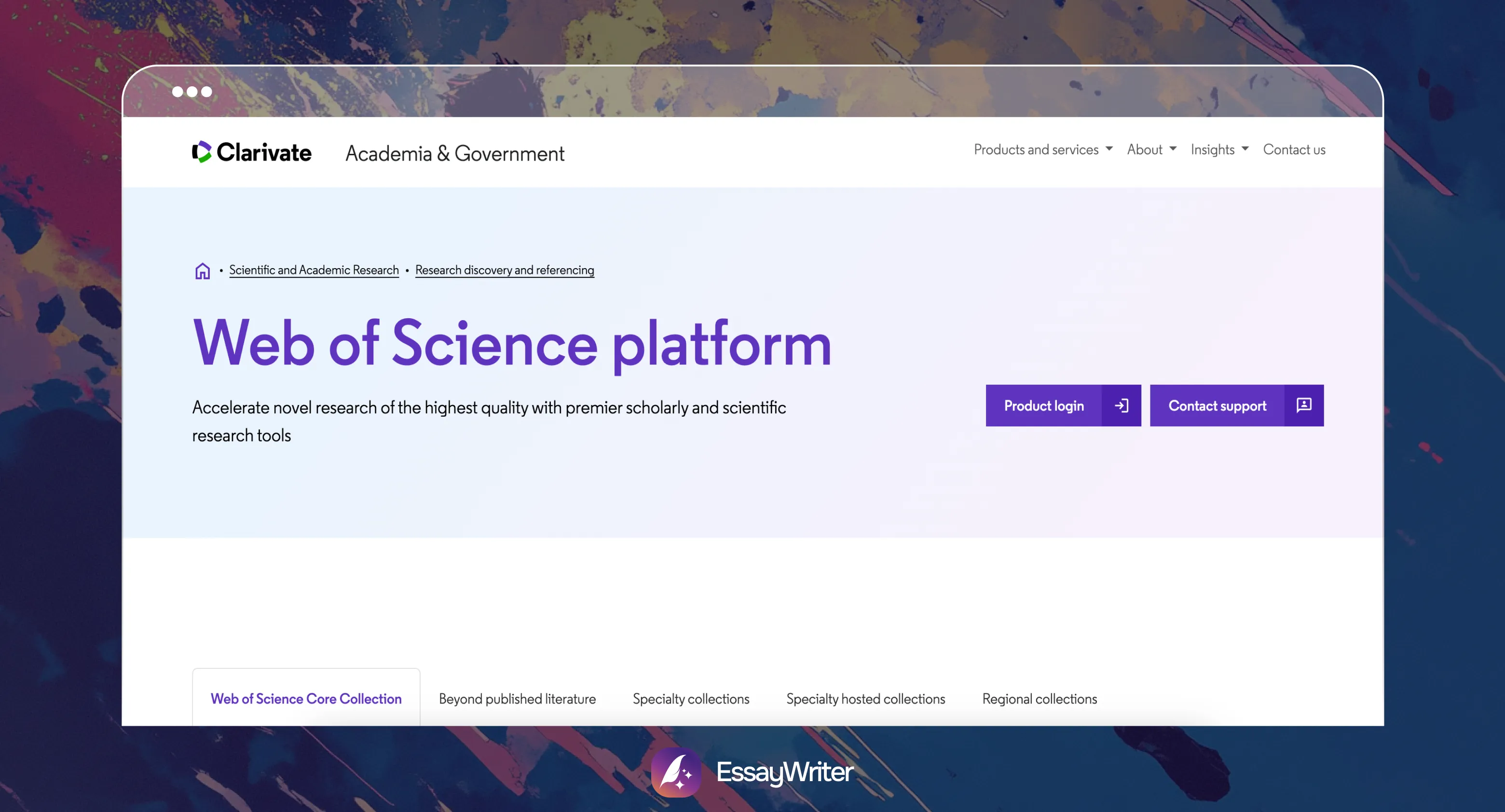
Web of Science helps you map how academic influence "travels". It focuses on relationships between studies rather than treating each publication as isolated.
- Scope: Citation data and journal indexing across many disciplines.
- References: Shows how authors refer to each other’s work over time.
- Subject Areas: Cross-disciplinary coverage for academic review and synthesis.
- Access: Typically requires institutional credentials.
- Provider: Managed by Clarivate, a research analytics and indexing company.
CORE
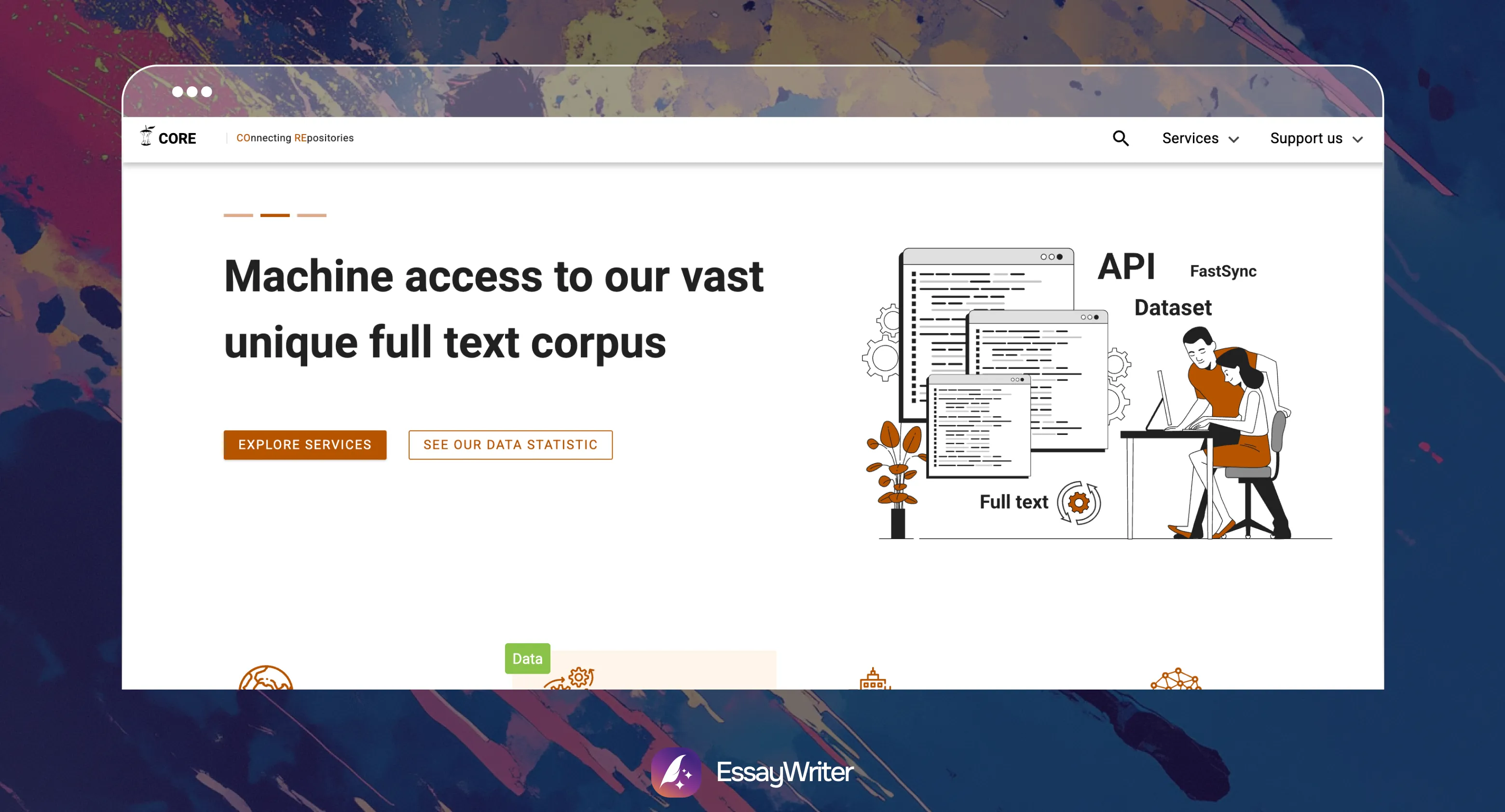
CORE collects research that institutions choose to release freely. It allows students to reach academic articles without waiting for library access.
- Scope: Repository papers, preprints, and institutional research documents.
- References: Metadata supports clear citation tracking.
- Subject Areas: Covers many academic fields without narrowing to a single focus.
- Access: Fully free access without login
- Provider: Developed by The Open University and Jisc as part of a global open research aggregation initiative.
Digital Commons Network
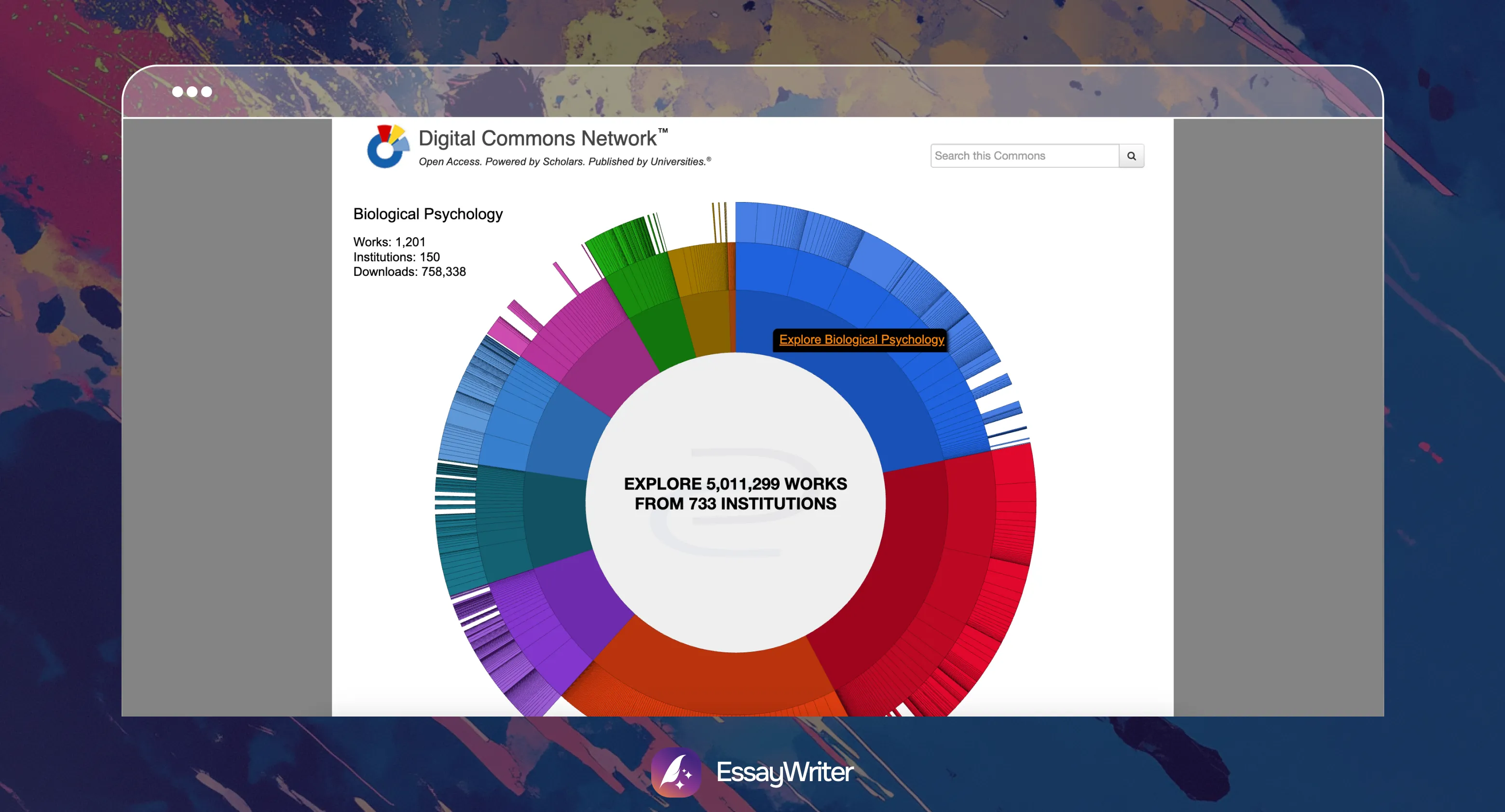
This platform shares independent work from universities. It offers insight into the questions, methods, and problems scholars explore in academic programs.
- Scope: Theses, dissertations, faculty papers, creative works, and teaching materials.
- References: Source records remain easy to document in academic formatting.
- Subject Areas: Humanities, arts, law, business, education, and more.
- Access: Publicly available without institutional login.
- Provider: Hosted by bepress (Berkeley Electronic Press), which supports institutional scholarship networks.
Advantages of Using an Academic Research Database
The right databases make conducting academic research easier; it's as simple as that. They bring trustworthy sources together in one place, so you don’t waste time sorting through random results online. Below, we've listed the main advantages of using the right databases.
Credible Sources
Academic databases collect material that has gone through professional review. The research comes with documented methods and sources you can trace. This means that most scholarly articles you read are reliable.
Organized Searching
The search environment in a trustworthy academic database feels structured. Filters help break your topic into workable pieces, which allows you to find what you need without being overwhelmed. You can move idea by idea and check relevance as you go. This keeps your attention in the right place instead of chasing unrelated results.
Reliable Citations
These platforms show the citation details directly. Page numbers, journal titles, and publication years appear consistently. You can pay more attention to writing because you don't have to spend time verifying sources. This also lowers the chance of accidental errors in your references, which can affect the credibility of your final paper.
Broad Academic Exposure
Using databases across fields introduces you to new academic voices and writing styles. You begin to see how scholars form arguments and connect ideas over time. This experience influences how you think and how you frame your own work. Your research becomes more informed and intentional.
Check out our guide on how to detect AI in student writing if you want your work to be read as completely human.
The Bottom Line
Academic databases help you find reliable information and work with sources that support strong research. They give you access to sources across many fields and help you build arguments backed by evidence.
Once you collect the sources, a professional from EssayWriter can help you organize your notes and turn your ideas into clear arguments.
FAQs
What Are the Best Databases for Academic Research?
Google Scholar works well when you want a broad start, because it pulls research from many academic sources at once. JSTOR is another well-known one because it supports deeper reading in the humanities and social sciences.
What Are the Best Free Academic Research Databases for Students?
DOAJ allows you to read peer-reviewed articles without paywalls. CORE gives access to papers shared by universities and research institutions. Both help students gather credible material without subscription barriers.
Which Academic Databases Do Universities Trust the Most?
Universities consistently use Web of Science for citation tracking and long-term publication records. PubMed remains a standard source in health and life science programs.
How Do I Choose the Best Database for My Research Project?
Start by identifying your topic’s general field. Then, find the database that organizes work in that particular area. Filters will help you narrow down the results, so you can easily find what you're looking for.
Is Google Scholar the Same as JSTOR?
No, the two databases are not the same. Google Scholar is a wide academic search tool. JSTOR, on the other hand, stores curated scholarly literature with long-term archival stability.
- Blanck, J. (2024). Welch Medical Library Guides: Expert Searching: Which Databases to Use. https://browse.welch.jhmi.edu/welch-medical-library-guides/home. https://browse.welch.jhmi.edu/searching/databases-by-subject
- Online Resources & Databases | The New York Public Library. (2023). The New York Public Library. https://www.nypl.org/research/collections/online-resources-databases
- Gusenbauer, M., & Haddaway, N. R. (2020). Which Academic Search Systems Are Suitable for Systematic Reviews or meta‐analyses? Evaluating Retrieval Qualities of Google Scholar, PubMed, and 26 Other Resources. Research Synthesis Methods, 11(2), 181–217. https://onlinelibrary.wiley.com/doi/10.1002/jrsm.1378
Recommended articles



